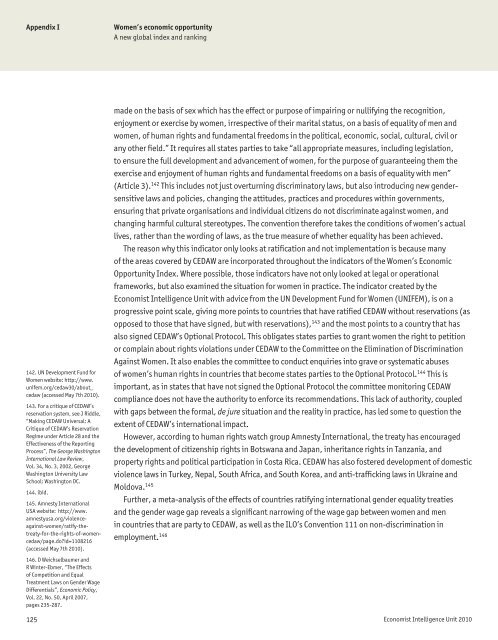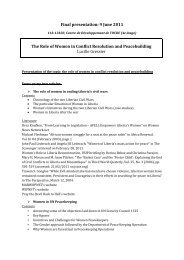Women's Economic Opportunity Index - Economist Intelligence Unit
Women's Economic Opportunity Index - Economist Intelligence Unit
Women's Economic Opportunity Index - Economist Intelligence Unit
- No tags were found...
Create successful ePaper yourself
Turn your PDF publications into a flip-book with our unique Google optimized e-Paper software.
Appendix IWomen’s economic opportunityA new global index and ranking142. UN Development Fund forWomen website: http://www.unifem.org/cedaw30/about_cedaw (accessed May 7th 2010).143. For a critique of CEDAW’sreservation system, see J Riddle,“Making CEDAW Universal: ACritique of CEDAW’s ReservationRegime under Article 28 and theEffectiveness of the ReportingProcess”, The George WashingtonInternational Law Review,Vol. 34, No. 3, 2002, GeorgeWashington University LawSchool: Washington DC.144. ibid.145. Amnesty InternationalUSA website: http://www.amnestyusa.org/violenceagainst-women/ratify-thetreaty-for-the-rights-of-womencedaw/page.do?id=1108216(accessed May 7th 2010).146. D Weichselbaumer andR Winter-Ebmer, “The Effectsof Competition and EqualTreatment Laws on Gender WageDifferentials”, <strong>Economic</strong> Policy,Vol. 22, No. 50, April 2007,pages 235-287.made on the basis of sex which has the effect or purpose of impairing or nullifying the recognition,enjoyment or exercise by women, irrespective of their marital status, on a basis of equality of men andwomen, of human rights and fundamental freedoms in the political, economic, social, cultural, civil orany other field.” It requires all states parties to take “all appropriate measures, including legislation,to ensure the full development and advancement of women, for the purpose of guaranteeing them theexercise and enjoyment of human rights and fundamental freedoms on a basis of equality with men”(Article 3). 142 This includes not just overturning discriminatory laws, but also introducing new gendersensitivelaws and policies, changing the attitudes, practices and procedures within governments,ensuring that private organisations and individual citizens do not discriminate against women, andchanging harmful cultural stereotypes. The convention therefore takes the conditions of women’s actuallives, rather than the wording of laws, as the true measure of whether equality has been achieved.The reason why this indicator only looks at ratification and not implementation is because manyof the areas covered by CEDAW are incorporated throughout the indicators of the Women’s <strong>Economic</strong><strong>Opportunity</strong> <strong>Index</strong>. Where possible, those indicators have not only looked at legal or operationalframeworks, but also examined the situation for women in practice. The indicator created by the<strong>Economist</strong> <strong>Intelligence</strong> <strong>Unit</strong> with advice from the UN Development Fund for Women (UNIFEM), is on aprogressive point scale, giving more points to countries that have ratified CEDAW without reservations (asopposed to those that have signed, but with reservations), 143 and the most points to a country that hasalso signed CEDAW’s Optional Protocol. This obligates states parties to grant women the right to petitionor complain about rights violations under CEDAW to the Committee on the Elimination of DiscriminationAgainst Women. It also enables the committee to conduct enquiries into grave or systematic abusesof women’s human rights in countries that become states parties to the Optional Protocol. 144 This isimportant, as in states that have not signed the Optional Protocol the committee monitoring CEDAWcompliance does not have the authority to enforce its recommendations. This lack of authority, coupledwith gaps between the formal, de jure situation and the reality in practice, has led some to question theextent of CEDAW’s international impact.However, according to human rights watch group Amnesty International, the treaty has encouragedthe development of citizenship rights in Botswana and Japan, inheritance rights in Tanzania, andproperty rights and political participation in Costa Rica. CEDAW has also fostered development of domesticviolence laws in Turkey, Nepal, South Africa, and South Korea, and anti-trafficking laws in Ukraine andMoldova. 145Further, a meta-analysis of the effects of countries ratifying international gender equality treatiesand the gender wage gap reveals a significant narrowing of the wage gap between women and menin countries that are party to CEDAW, as well as the ILO’s Convention 111 on non-discrimination inemployment. 146125 <strong>Economist</strong> <strong>Intelligence</strong> <strong>Unit</strong> 2010




